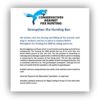https://www.thetimes.co.uk/article/theresa-may-ditches-foxhunting-to-back-animal-rights-dz6ctp0kd
Theresa May is to abandon a manifesto pledge to overturn the ban on foxhunting as she seeks to rebrand the Conservatives as a “caring” party.
In a move certain to infuriate many of the party’s rural supporters — and split its MPs — she will announce plans to drop the commitment permanently early in 2018.
The disclosure comes two days before the Boxing Day meets, the biggest of the year, when 250,000 people are expected to gather at hunts nationwide.
May’s move follows a fierce voter backlash, especially among young people, against her pro-hunting policy in this year’s general election.
A Survation poll taken days before the election found that 67% of voters believed foxhunting should remain illegal. Half said they would be less likely to vote for a candidate who supported it.
The prime minister has previously been strongly in favour of blood sports, voting against the ban on hunting with hounds, which was passed in 2004, and insisting on retaining a manifesto pledge to let MPs repeal or amend it. “Some of the other forms of dealing with foxes can be cruel, so my view is it should be a free vote for parliament,” she said during the election campaign.
That idea has now been shelved for good. “The prime minister will make it clear in an intervention early in the new year that this is no longer a Conservative Party policy,” said a senior Whitehall source.
The policy reversal will affect about 170 packs of registered foxhounds, plus more than 80 packs of harriers, beagles and basset hounds that were historically used to hunt hares. The hunts and their 40,000 members have kept going since the 2004 ban, hoping it would be reversed.
Under the 2004 act, hunts must follow artificial trails. Animal rights groups claim many still kill animals.
Michael Gove, the environment secretary, who was also previously in favour of blood sports, is expected to back May — potentially enshrining the new approach in laws he is piloting through parliament. Last month he faced a parliamentary and social media backlash over accusations that he was using Brexit legislation to reduce UK levels of protection for animals.
Gove responded by publishing a draft bill recognising animals, including wild ones, as “sentient”. A key clause says the government “must have regard to the welfare needs of animals as sentient beings in formulating and implementing government policy”. This clause is widely seen as ruling out any chance of a return for foxhunting.
For the Conservative Party — where hunting is a totemic issue — such a move could be divisive. Its membership is predominantly based in rural and market towns and tends to support traditional country sports.
The Conservatives have also benefited directly from manifesto pledges to revisit the hunt ban. Vote-OK, a pro-hunting organisation, mobilised thousands of supporters to canvass for Tory candidates in marginal seats during the 2005, 2010 and 2015 general elections.
Tim Bonner, chief executive of the Countryside Alliance, which campaigns against the hunt ban, said any such move by May and Gove could be disastrous.
“Conservative membership has already gone through the floor, so now it has only about 130,000 members. We have 100,000, while the British Association for Shooting and Conservation has 150,000,” he said.
“There are tens of thousands more in organisations like the National Farmers Union. There is a lot of overlap between their supporters and ours — who would not be happy.”
The brunt of managing the new policy will fall on Gove, who is tasked with overseeing the Conservatives’ latest attempt to shed its image as “the nasty party”.
He has already pledged to set up a “world-leading” body to protect the environment after Brexit. He has also banned bee-killing pesticides, outlawed plastic microbeads in soap products and backed the reintroduction of beavers.
For May the end of support for foxhunting is also linked to her slender majority and the fact that up to 60 Tory MPs would fight any attempt to lift the hunt ban, including at least three ministers. Sports minister Tracey Crouch, work and pensions minister Caroline Dinenage and justice minister Dominic Raab have all said they would oppose such a move.
May is expected to include the move away from hunting in the relaunch of her premiership planned for the new year, after the disastrous loss of three cabinet members — Michael Fallon, Priti Patel and Damian Green — in seven weeks.
Her allies predict she will bring in new faces, although Philip Hammond and Amber Rudd are expected to remain. The big debate will be about whether she moves Boris Johnson from the Foreign Office to a new role to deliver the domestic Brexit agenda.







